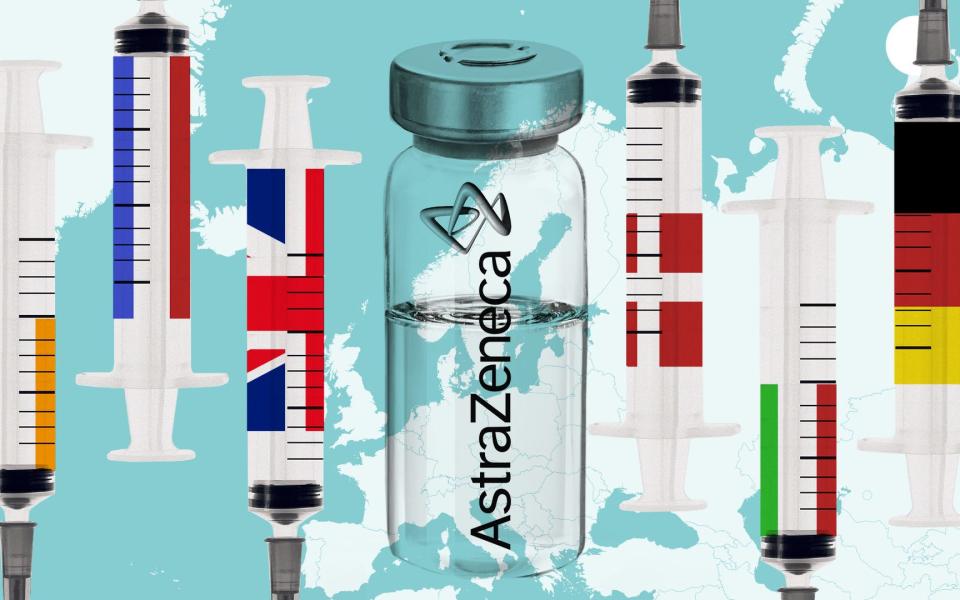How AstraZeneca defeated Brussels’ bid to derail its Covid vaccine

In the depths of the pandemic last year, Brussels made its first big bet on a Covid-19 jab.
AstraZeneca’s vaccine candidate, it said, was based on a “sound scientific approach”. Officials had taken factors such as production capacity into account and decided to place a €336m (£289m) order for 300m doses of AstraZeneca’s Covid-19 jab.
Ursula von der Leyen, the European Commission president said last August: “Today's agreement is the first cornerstone in implementing the European Commission's vaccines strategy."
Stella Kyriakides, EU commissioner for health and food safety, also thanked AstraZeneca for its "constructive engagement on this important agreement for our citizens”.
However, it was a sentiment that would not be echoed again. In the months that followed, a bitter battle over vaccine supplies erupted.
It is only now, more than a year after that deal was first struck, that there have been any signs of a thawing of icy relations.
On Friday, the EU stepped back from taking AstraZeneca to court for a second time and instead said it had agreed a settlement deal with the vaccine supplier.
The move, ending the pending legal action against the company, “guarantees the delivery of the remaining 200m Covid vaccine doses by AstraZeneca to the EU”, Kyriakides said.
“While this week we reached the important milestone of 70pc full vaccination of the EU's adult population, there are significant differences in vaccination rates between our member states, and the continued availability of vaccines, including AstraZeneca's, remain crucial.”
The wrangling has irked many in the scientific community. Sir John Bell, the vaccine tsar who helped broker the deal between the University of Oxford and AstraZeneca, describes it as a "completely unnecessary scrap" but adds it is "great that it has been resolved amicably".
Benjamin Haberkorn, a partner at law firm Eversheds Sutherland, says it's clear there was animosity and cross-claims over the past year.
Without seeing the settlement in full, he cautions that “it is hard to say which party backed down more than the other”. But, in his view, “the feud has been brought to an end, much to the benefit of the parties and probably of us all”.
Haberkorn may shy away from suggesting either side emerged victorious. Yet AstraZeneca perhaps had most to lose in an acrimonious court dispute.
Under the settlement, the company appears to be subject to less arduous conditions for delivering its vaccines - something that can only come as a relief to its beleagured bosses.
For months, Commission officials had been adamant the EU would get what was deemed to be “its fair share” of vaccines.
Brussels said it did not “accept the late delivery of the vaccines by AstraZeneca and considers that this is a violation of the contract”.
Initially the EU had expected 300m doses by June 2021. In a court case earlier this year, it had been pushing for this to happen at least before September. AstraZeneca now has until next March to deliver the remaining 200m doses.
What’s more, EU officials had been threatening to impose steep penalties on AstraZeneca should it fail to meet deadlines. It demanded in a court case earlier this year that the firm pay €10 per dose per day it failed to supply the doses, which could have spiralled into fines running into the billions.
Under the settlement, penalties will come in the form of capped rebates. If there is any delay “beyond the reasonable control of AstraZeneca”, the rebate will not be granted.
With all this in mind, it may seem like AstraZeneca has had a lucky escape. At the very least, removing the spectre of a looming court case with the EU would be expected to allow the company to finally focus to delivering doses rather than wrangling over schedules.
Yet it appears the damage has already been done. Early criticism from EU leaders including Emmanuel Macron, who branded the jab “quasi-ineffective for over-65s”, already seem to have made their mark. European countries have cut back on the age groups getting the vaccine.
A stockpile of some 6m doses is said to be building in Australia as people wait for the Pfizer jab - prompting pleas from political leaders not to cancel appointments.
Meanwhile, booster deals are being signed with Pfizer across the world, with AstraZeneca yet to have struck fresh agreements.
Clive Dix, the former chair of the UK’s vaccine taskforce, late last month lamented the “tarnished reputation” of AstraZeneca. The pharma firm, he said, had proved to be “exceptional” and viewing its jab as solely for “poor countries” is troubling.
AstraZeneca is delivering more doses to Covax, the body supplying doses to developing countries, than any other vaccine supplier. But Dix says this does not mean there is “a problem with it - it hasn’t got a problem”.
With the EU and AstraZeneca agreeing a settlement, it is hoped that more countries will look on the jab more favourably. Legal experts say this conclusion is something that should help rebuild trust, rather than the long, arduous process of going through the courts.
Within AstraZeneca, there is a drive to draw a line under the past year. Ruud Dobber, one of its senior management team, said he is “very pleased that we have been able to reach a common understanding which allows us to move forward and work in collaboration with the European Commission to help overcome the pandemic”.
Dobber, like many others, will be hoping that the damage done by the EU over the past year is not permanent.
